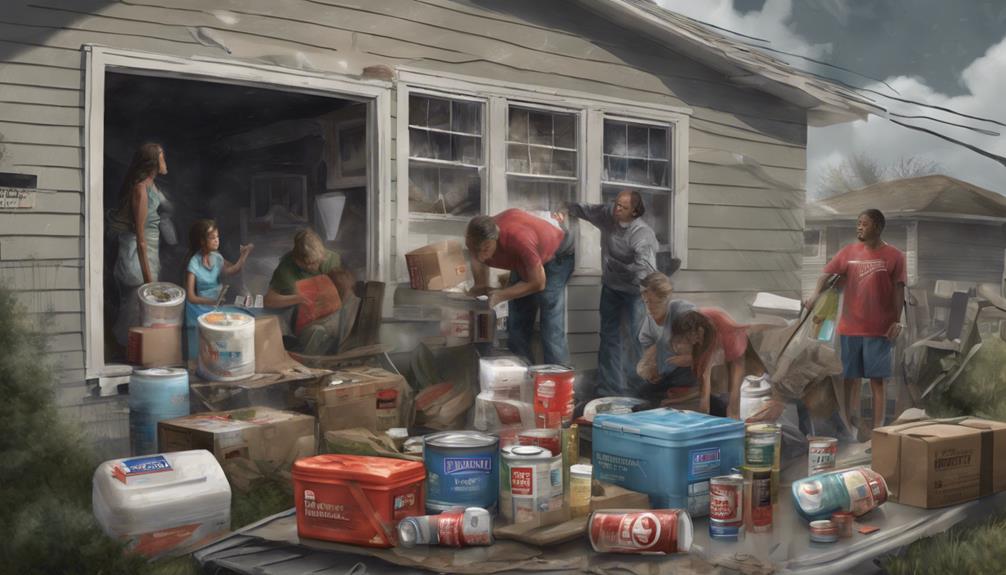When facing the looming threat of a hurricane, the importance of meticulous preparation cannot be overstated. From developing evacuation plans to securing essential supplies, each step taken prior to the storm's arrival plays a crucial role in safeguarding lives and property. However, amidst the plethora of advice and guidelines available, one must navigate through the sea of information with a discerning eye. How do we truly discern the most effective and practical measures to prepare for the unpredictable forces of nature?
Key Takeaways
- Understand the importance of hurricane preparedness
- Prioritize necessary supplies and emergency kits
- Develop an evacuation plan and communication strategy
- Ensure pet safety and include them in evacuation plans
Importance of Hurricane Preparedness
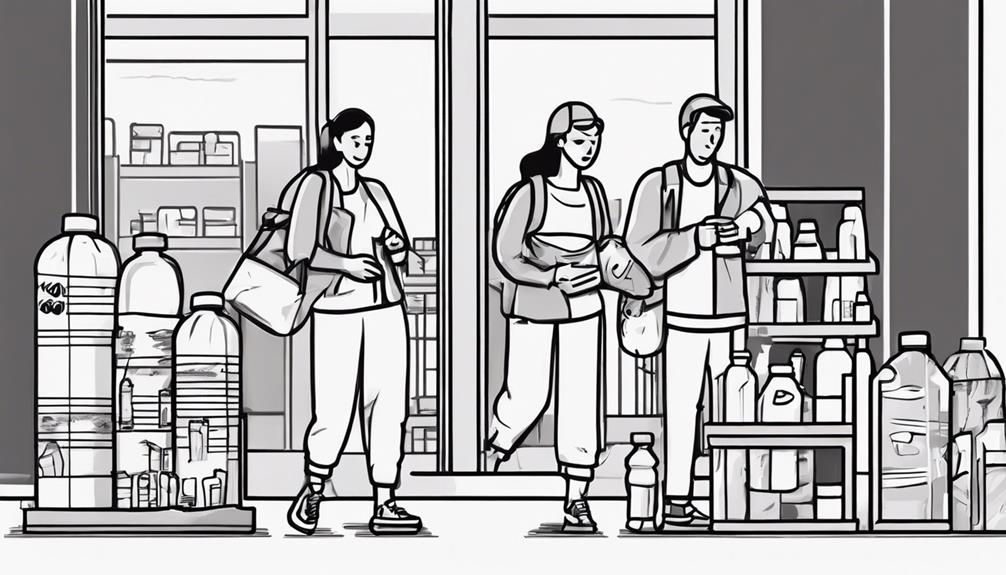
Understanding the importance of hurricane preparedness is crucial for individuals and communities to mitigate risks, enhance safety measures, and minimize potential damages during these severe weather events. One key aspect of hurricane preparedness is hurricane evacuation. When authorities issue evacuation orders, it is vital to heed these warnings promptly. Evacuation plans are designed to ensure the safety of residents in high-risk areas by moving them to safer locations before the hurricane strikes. Ignoring evacuation orders can lead to increased dangers, including being stranded in flooded areas or facing life-threatening situations.
Hurricane evacuation involves following designated evacuation routes, packing essential items such as food, water, medication, important documents, and emergency supplies, and knowing where local shelters are located. By evacuating early, individuals can avoid traffic congestion, reduce the likelihood of accidents, and reach safe locations in a timely manner. Properly executed evacuation plans not only save lives but also alleviate the strain on emergency responders and resources during the storm.
Develop an Evacuation Plan
When considering the development of an evacuation plan for a hurricane, it is crucial to identify safe meeting spots, determine alternate routes, and establish optimal timing for departure. These factors play a critical role in ensuring a smooth and efficient evacuation process during emergencies. By carefully planning these aspects, individuals can enhance their preparedness and response capabilities in the face of a hurricane threat.
Safe Meeting Spots
How can the strategic designation of safe meeting spots outside the evacuation area enhance the efficiency of an evacuation plan during a hurricane? Designating multiple safe meeting spots in easily accessible locations such as parks, schools, or community centers can significantly streamline the reunification process in case family members get separated during evacuations. By ensuring all family members are informed about these meeting points and practicing the evacuation plan, the likelihood of a smooth reunion increases. Including a list of these meeting spots in the family emergency plan and emergency kit allows for quick reference and communication during the evacuation process. This strategic approach not only fosters preparedness but also facilitates coordination and safety during the turbulent times of a hurricane.
Route and Timing
To optimize the efficiency of an evacuation plan during a hurricane, meticulous consideration of evacuation routes and timing is paramount. When developing an evacuation plan, the following factors should be taken into account:
- Determine Primary and Alternative Evacuation Routes: Identify the most direct routes out of your area and have backup routes planned in case the primary ones are inaccessible.
- Account for Evacuation Time: Consider the time it will take to evacuate, including packing essentials, securing your home, and potential traffic congestion on the roads.
- Stay Informed: Stay updated on evacuation orders, timelines provided by local authorities, and the latest weather forecasts to ensure timely and safe evacuation.
Secure Your Home

During a hurricane, securing your home is paramount to minimizing potential damage and ensuring safety. To achieve this, consider installing storm shutters to protect windows from high winds and debris. Additionally, secure outdoor items or bring them indoors to prevent them from turning into dangerous projectiles during strong winds. Trim trees and shrubs near your home to decrease the risk of branches causing damage in a storm. It is also crucial to check and reinforce doors and garage doors to ensure they can withstand powerful winds and prevent water intrusion. Remember to secure outdoor sculptures, patio furniture, and other loose items that could be blown around or damaged during a hurricane.
Protective Measures for Securing Your Home:
| Protective Materials | Actions |
|---|---|
| Install storm shutters | Protect windows from debris |
| Secure outdoor items | Prevent them from becoming projectiles |
| Trim trees and shrubs | Reduce risk of branch damage |
| Check and reinforce doors | Ensure they withstand strong winds |
Stock Up on Supplies
Prioritize acquiring necessary supplies for emergency preparedness by stocking up on essential items to sustain you and your family during a hurricane. When gathering supplies, focus on non-perishable food items, water, and essential items for health and safety. Here are three crucial items to include in your emergency supply kit:
- Non-perishable Food: Stock up on non-perishable food items such as canned goods and dry goods that can last for an extended period without refrigeration. Ensure you have enough to sustain each family member for at least three days without power.
- Water: Ensure you have an adequate supply of water, with at least one gallon per person per day for drinking and sanitation needs. Water is essential for staying hydrated and maintaining sanitation during and after a hurricane.
- Essential Items: Don't forget to include essential items like medications, a first aid kit, hygiene products, and baby supplies if needed. These items are crucial for maintaining health and hygiene during a hurricane when access to stores may be limited.
Stay Informed
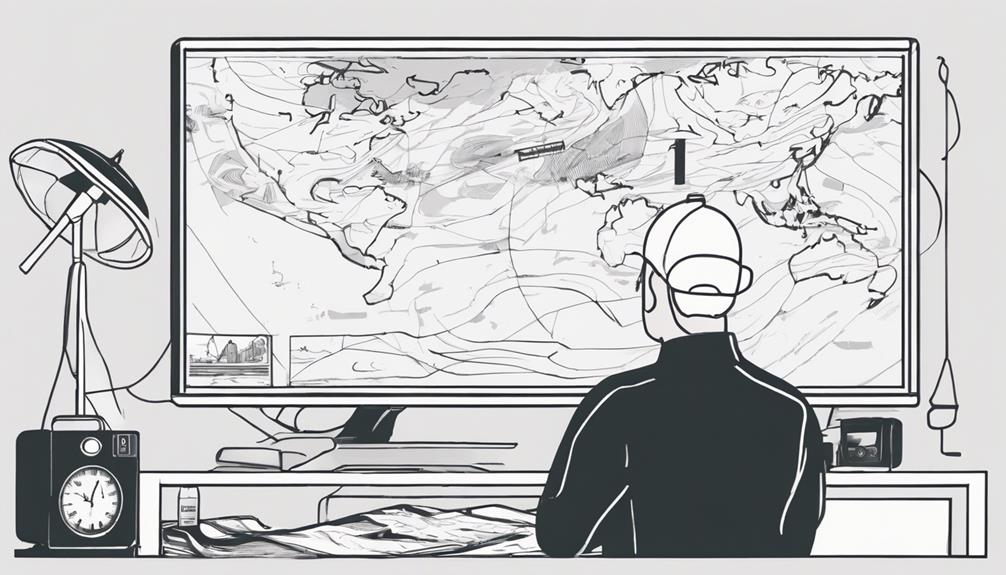
Regularly monitor NOAA Weather radio or local news channels for updates on the hurricane's progress to stay well-informed about the evolving situation. Following official sources like the National Hurricane Center is crucial to ensure you receive accurate information and forecasts. Signing up for emergency alerts and notifications can provide you with timely evacuation orders and essential safety instructions, helping you make informed decisions during the hurricane.
Staying connected with family, friends, and neighbors is also important to share information and offer support to one another. In times of crisis, collective knowledge and collaboration can make a significant difference in staying safe and prepared. Additionally, keeping a battery-powered radio on hand is advisable in case of power outages, as it can be a reliable source of information about the hurricane situation when other communication channels are disrupted. By staying informed through various channels and maintaining open communication with others, you can better navigate the challenges posed by a hurricane.
Prepare Emergency Kit
To effectively prepare for a hurricane, assembling an emergency kit is essential. During hurricane season, having a well-equipped emergency kit can make a significant difference in your ability to weather the storm safely. Here are three crucial items to include in your emergency supplies:
- Non-Perishable Food and Water: Stock up on canned goods, energy bars, and other non-perishable food items that require no refrigeration. Aim for at least a three-day supply of food and one gallon of water per person per day.
- Essential Supplies: Pack flashlights with extra batteries, a portable radio to stay informed, and a first aid kit for any medical emergencies that may arise during or after the hurricane. These items can help you navigate through power outages and potential injuries.
- Additional Necessities: Consider including cash, hygiene items like hand sanitizer and wet wipes, a multi-tool for various tasks, and extra clothing to stay comfortable in changing conditions. Don't forget to cater to the needs of pets, infants, elderly family members, or individuals with specific medical requirements.
Remember to regularly check and update your emergency kit to ensure that all supplies are current, functioning, and ready for any potential hurricane-related challenges.
Safeguard Important Documents
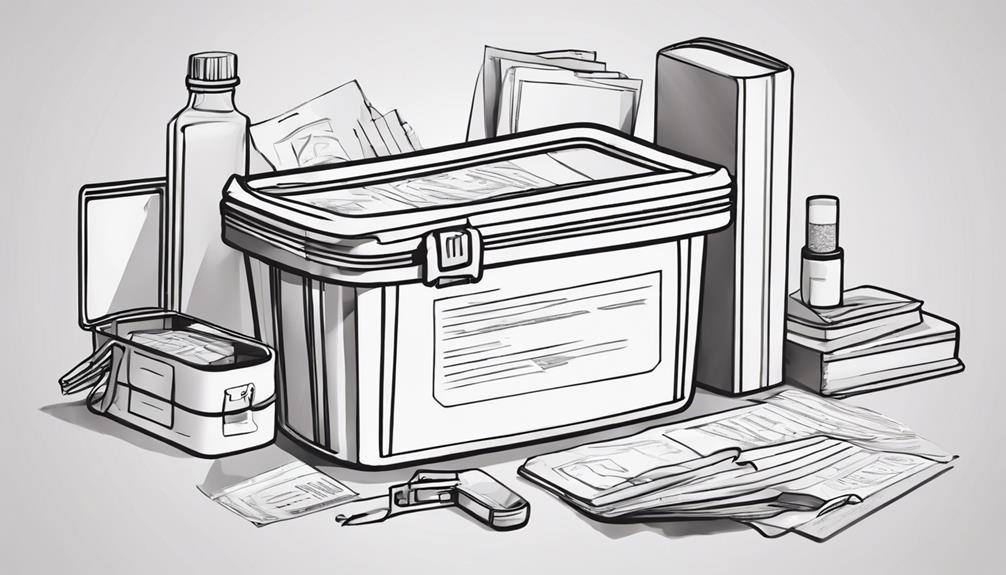
Safeguarding important documents during a hurricane is crucial for ensuring the protection and accessibility of vital information. Storing physical copies in a waterproof container and creating digital backups on secure platforms can prevent loss or damage. Utilizing fireproof safes or safety deposit boxes adds an extra layer of security for valuable papers and irreplaceable items.
Document Protection Tips
Protecting critical financial, medical, educational, and legal documents during a hurricane is crucial for ensuring their safety and accessibility. To safeguard these important documents effectively, consider the following tips:
- Store documents in a waterproof bag to protect them from potential water damage during a storm surge.
- Back up all essential documents electronically to ensure redundancy and protection.
- Take a video tour of your home before a hurricane to document belongings and their condition, aiding in insurance claims if needed.
Digital Backup Solutions
Critical documents such as financial records, medical information, and identification cards can be effectively safeguarded through reliable digital backup solutions at home. Storing electronic copies in secure cloud storage or external hard drives can protect against physical damage during a hurricane. Implementing password protection and encryption adds an extra layer of security to these digital documents, ensuring their confidentiality. Regularly updating and maintaining these backups is crucial to guarantee their accuracy and accessibility when needed. Considering online backup services or apps specifically designed for safeguarding important documents can provide additional peace of mind during times of potential disaster. By following these digital backup strategies, individuals can better prepare for unforeseen events like hurricanes and safeguard their critical information effectively.
Evacuation Routes and Shelters
When preparing for a hurricane, it is essential to familiarize yourself with your local evacuation routes and nearby emergency shelters. Understanding these key elements can significantly increase your chances of staying safe during a storm. Here are some crucial points to consider:
- Map Out Your Evacuation Routes: Knowing the roads and highways that lead to safety can prevent confusion and delays when the need to evacuate arises. Familiarize yourself with multiple routes in case some are blocked or congested.
- Identify Nearby Emergency Shelters: Research the locations and capacities of shelters near your area. Different shelters may cater to specific needs, such as medical requirements or pet accommodations, so choose the one that suits your situation best.
- Stay Informed About Evacuation Zones: Be aware of designated evacuation zones in your region and stay updated on their status during a hurricane. Following official instructions and evacuating promptly can help safeguard your life and the lives of others.
Protect Your Pets
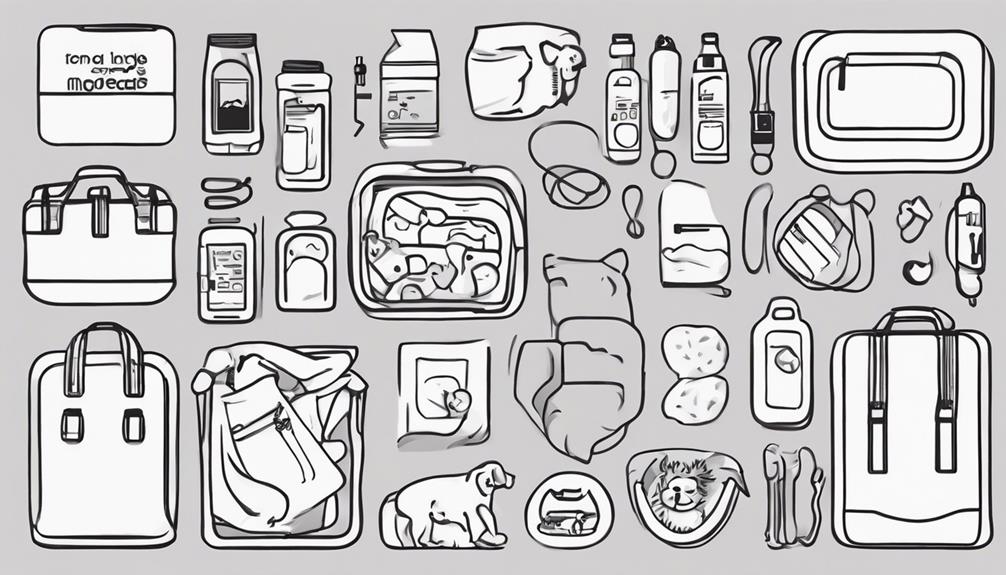
Understanding the importance of safeguarding your pets during a hurricane is a critical aspect of comprehensive disaster preparedness. Including pets in your family emergency plan involves designating caregivers and making evacuation arrangements in advance. It is essential to prepare a pet emergency kit that includes an ample supply of food, water, medications, medical records, and comfort items to ensure their well-being during the storm. Additionally, ensuring that pets are microchipped and have ID tags with current contact information can help reunite lost pets with their owners.
Moreover, it is crucial to locate pet-friendly shelters or hotels ahead of time and have a list of boarding facilities as part of your evacuation plan. Practicing evacuating with your pets can help reduce stress and ensure a smooth process when faced with a hurricane. By incorporating these measures into your disaster preparedness strategy, you can better protect your beloved pets and ensure their safety during a hurricane.
Secure Outdoor Items
Ensuring the security of outdoor items during a hurricane is critical to prevent potential hazards. Anchoring loose items such as patio furniture, decorations, and equipment can mitigate the risk of them becoming dangerous projectiles in high winds. Storing these items in a garage or tying them down can help minimize the impact of strong winds and reduce the likelihood of property damage.
Anchor Loose Items
To mitigate the risk of outdoor items transforming into hazardous projectiles during high winds, it is imperative to anchor loose furnishings, decorations, and equipment securely. When preparing for a hurricane, consider the following:
- Use Hurricane Straps: Utilize hurricane straps to secure items like patio umbrellas, grills, and garden tools that could be easily lifted by strong winds.
- Tie-Downs: Secure loose items such as trash cans, potted plants, and outdoor toys with tie-downs to a sturdy structure to prevent damage or injury.
- Stakes: Use stakes to anchor down lightweight items that may be susceptible to being blown away, ensuring they remain in place during the storm.
Taking these precautions can help prevent damage and ensure safety during severe weather conditions.
Store in Garage
Garage storage provides a strategic solution for safeguarding outdoor items from potential projectile hazards during a hurricane. By utilizing the garage space effectively, homeowners can protect valuable outdoor belongings from being picked up by strong winds and causing damage. Storing items such as patio furniture, grills, garden tools, sports equipment, and recreational gear in the garage can prevent them from becoming dangerous projectiles during a storm. Additionally, keeping bicycles, camping gear, and other outdoor items secure behind closed garage doors can help ensure they remain undamaged and readily available once the hurricane passes. This proactive measure not only safeguards possessions but also minimizes the risk of these items causing harm or damage in the event of a hurricane.
| Benefits of Storing in Garage |
|---|
| Protects items from wind damage |
| Prevents outdoor items from becoming projectiles |
| Ensures easy access post-hurricane |
Communication Plan for Family
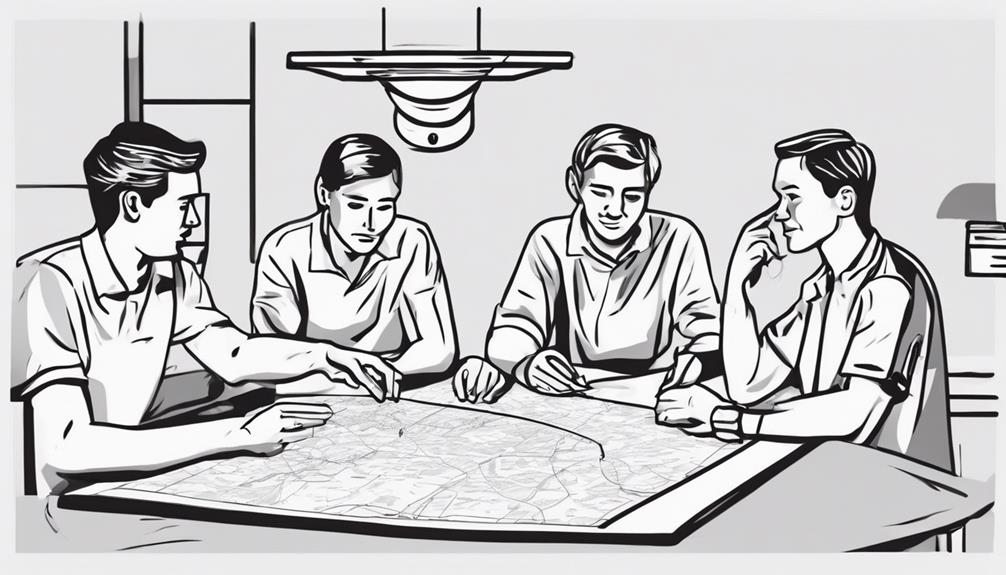
How can a well-prepared family ensure effective communication during a hurricane? Establishing a solid communication plan is crucial for ensuring everyone's safety and well-being. Here are three key steps to consider:
- Designated Communication Methods and Meeting Points: Assign specific communication methods such as text messaging, phone calls, or social media platforms that will be used to stay in touch. Additionally, establish meeting points within the community or at a designated shelter in case family members are separated.
- Emergency Contact Information: Make sure all family members have a list of emergency contacts readily available. Ensure everyone knows how to reach each other and other important contacts in case of an emergency.
- Practice and Preparedness: Regularly practice the communication plan with family members. Conduct drills to ensure everyone understands their roles and responsibilities in different scenarios. Include a copy of the communication plan in the family's emergency kit for quick reference during stressful situations.
Financial Preparedness
Considering the potential financial implications of a hurricane, prudent individuals prioritize financial preparedness to safeguard against unforeseen expenses and ensure stability in the aftermath of a disaster. One crucial aspect of financial preparedness is reviewing insurance policies to guarantee adequate coverage for hurricane-related damages to property, belongings, and additional living expenses. It is advisable to build an emergency fund to cover potential costs such as evacuation expenses and property repairs. Additionally, keeping essential financial documents in a waterproof and secure location can prevent water damage during a hurricane. Setting up automatic bill payments or electronic statements can help meet financial obligations even during and after a hurricane. Moreover, contacting financial institutions to explore disaster assistance programs or options for managing finances in the event of a hurricane is prudent. Ensuring that insurance policies are comprehensive and up to date can significantly alleviate the financial burden of hurricane-related losses.
| Financial Preparedness Tips |
|---|
| Build an emergency fund |
| Review insurance policies |
| Secure important documents |
| Set up automatic bill payments |
Frequently Asked Questions
How Do You Prepare for a Level 1 Hurricane?
When preparing for a level 1 hurricane, it is crucial to prioritize emergency supplies. These should include non-perishable food, water, medications, and batteries to last for at least 72 hours. Securing outdoor items, reinforcing windows, doors, and roofs, and staying informed about evacuation orders are also key steps. Developing a family emergency plan with designated meeting points and communication methods ensures readiness in the event of a hurricane.
How Do Families Prepare for a Hurricane?
Preparing for a hurricane as a family involves creating comprehensive emergency kits tailored to each member's needs. Essential items like food, water, medications, and critical documents should be included. Establishing communication methods, evacuation routes, and shelter locations are crucial. Keeping up-to-date with the hurricane's progress and staying connected with loved ones and authorities is essential for safety. Practice the emergency plan with family or friends to ensure readiness.
What Are the Steps to a Hurricane?
Hurricanes follow a distinct set of stages: tropical disturbance, tropical depression, tropical storm, and hurricane. Evacuation is crucial when facing an impending hurricane, as it can save lives and prevent injuries. Understanding the progression of a hurricane and heeding evacuation orders are essential steps in ensuring safety and minimizing damage. It is imperative to stay informed about evacuation routes, shelters, and emergency plans to navigate through each stage of a hurricane effectively.
What Are Some Safety Tips for Hurricane Weather?
During hurricane weather, prioritize safety by securing emergency supplies. Stock up on essentials like flashlights, batteries, food, water, and first aid kits. Stay informed by monitoring official weather updates and alerts. When indoors, avoid windows to prevent injury from shattered glass. Secure outdoor items to prevent them from becoming dangerous projectiles in high winds. Protect windows and doors with storm shutters or plywood to minimize damage from flying debris.
Conclusion
In conclusion, effective hurricane preparedness is crucial in ensuring the safety and well-being of individuals and families during severe weather events. By developing evacuation plans, securing homes, stocking up on supplies, staying informed, and protecting pets, individuals can minimize risks and better navigate the challenges of a hurricane. It is imperative to take proactive steps and follow official instructions to mitigate potential dangers and ensure a more secure outcome. Remember, preparedness is key in facing the uncertainties of nature.
